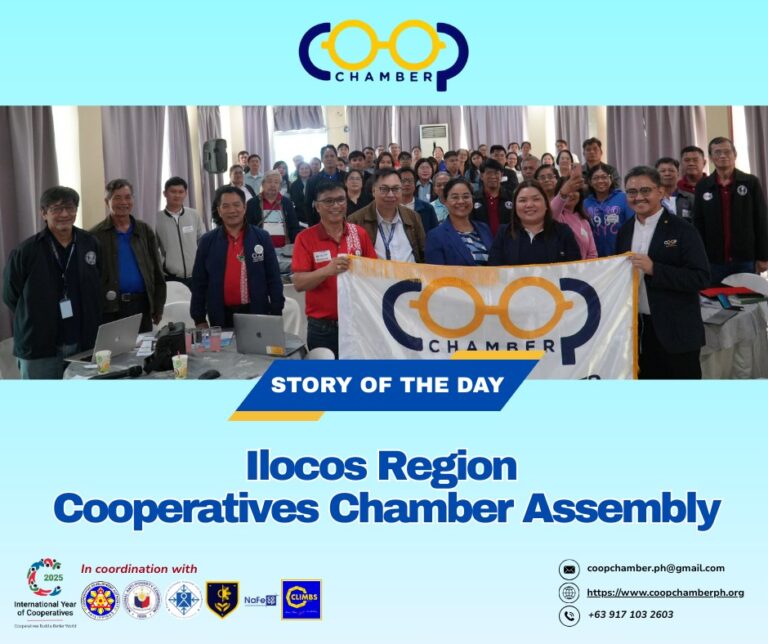PRESS RELEASE
October 2024 Cooperative Month
Democratic Member Control and Empowerment of individual or member- cooperative, the real celebration of Cooperative Month
Throughout the country, the cooperative movement celebrates a month- long event to deepen the cooperative identity and highlight its role in empowering its members and their cooperatives in the economic, policy- making, governance, and cultural aspects of our society.
Since its enactment on December 16, 2020, Republic Act 11502, officially declared the Month of October of Every Year as the “National Cooperative Month”. Cooperatives are recognized as conduits and partners of the government in delivering services and programs to our members and communities. Moreover, cooperatives actively engage in governance and policy-making to ensure that cooperative values and principles are upheld at all levels.
The Cooperative Chamber emphasizes that the cooperative’s business model should not be modeled after corporations, as they have different business undertakings and declared principles and values.
One of the main differences between a cooperative and a corporation is control. A corporation’s control depends on the number of shares and corresponding share voting, while in a cooperative, control is defined by the principle of one member, one vote (for primary cooperatives) and one cooperative, one vote for a federation, ensuring that control lies with the general membership and not a select few.
The Cooperative Chamber would like to highlight that Section 44 of HB 9673 and Section 45 of Senate Bill 2811 contradict Cooperative Principle No. 2, which is Democratic Member Control. This principle dictates that cooperatives are democratic organizations controlled by their members who actively participate in setting policies and making decisions, with elected representatives being accountable to the membership. In primary cooperatives, members have equal voting rights, while cooperatives at other levels are organized in a similar democratic manner.
While cooperatives with higher shares receive greater patronage refunds and interest on capital, there are no majority or minority shareholders, as a cooperative is not a corporation. The one-member, one-vote principle is essential to the cooperative structure, as cooperatives exist to serve the needs of their members, ensuring decisions are made in line with the 2nd Principle, Democratic Member Control.
This means that each member has an equal say and vote in the decision- making process. It’s crucial to note that even at other levels, the one-member, one-vote or the one cooperative, one vote must be maintained. The number of shares a member holds must not give them more voting power, as this would lead to a few members with more shares having more control and potentially monopolizing the cooperative.
In corporations, shareholders with more shares have more voting power. However, cooperatives do not follow this approach, as it does not allow for fair and equal representation of all members.
In the Senate hearing conducted by the Senate Committee on Cooperatives, chaired by Senator Imee R. Marcos, Mr. Noel Raboy, CEO and President of CLIMBS Life and General Insurance Cooperative and Chairperson of the Philippine Chamber of Cooperatives Inc., expressed openness to allowing 40% share capital holdings in a federation, on the condition that such shares do not carry voting rights.
If share voting becomes part of the law, difficulties would arise in ensuring that arrangements remain fit for their democratic purpose. The government should promote the viability and growth of cooperatives as instruments for social justice and economic development, and in doing so, the proposed share voting should not be pursued, and the one-member, one-vote or the one cooperative, one vote must be maintained.
President Ferdinand “Bongbong” Marcos Jr. highlighted the crucial role of cooperatives in developing the production and market power of the agriculture sector, among others. Hence, he emphasized the need to amend the provisions of RA 9520, the Cooperative Code, during his 2nd State of the Nation Address (SONA) on July 24, 2023.
Given that the amendments to RA 9520 are President Bongbong Marcos Jr.’s priority bills, the Cooperative Chamber and its primary cooperative members request the Senate to expedite the passage of this bill and eventually enact it into law.
Finally, the Cooperative Chamber is committed to addressing vital issues and concerns affecting cooperatives through legislative advocacy and lobbying efforts to advance national and regional agendas supporting cooperative ideals, principles, and values.
Contact details:
Edwin A. Bustillos
Executive Director
Mobile No. 09178017309




